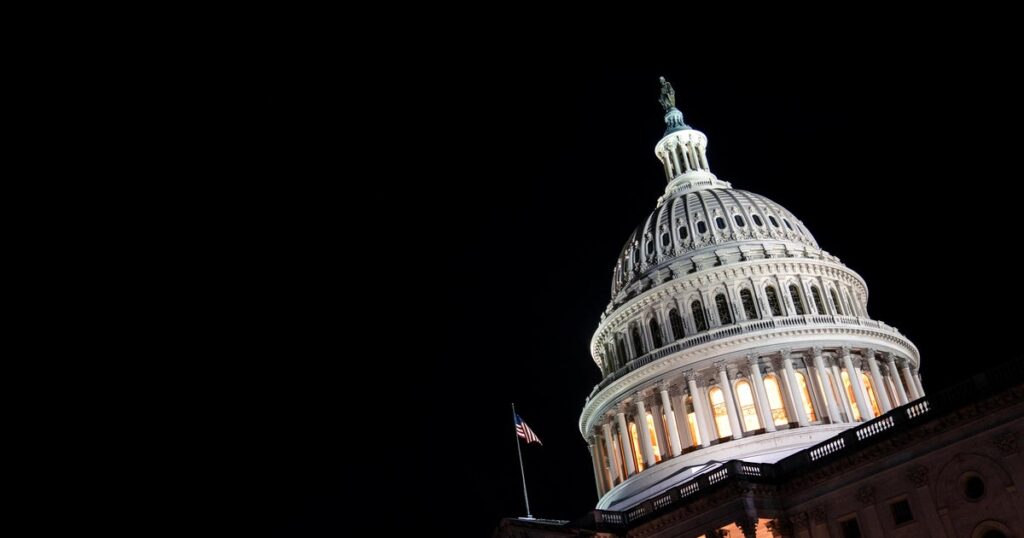Washington — The House was moving early Thursday toward a vote on President Trump’s domestic policy bill, hours after unveiling an updated version of the legislation that Republican leaders hope will satisfy enough holdouts.
The measure cleared a critical hurdle — a procedural vote to begin debate on the massive budget package. A vote on the bill could follow later in the morning.
The legislation, which addresses the president’s tax, defense and energy priorities, has overcome several setbacks since the beginning of the year after GOP leadership made repeated assurances to holdouts that their concerns would be addressed later if they kept the legislation moving forward.
But as Speaker Mike Johnson’s self-imposed deadline to get the measure across the finish line in the House by Memorial Day quickly approached, the Louisiana Republican was facing increasing opposition from several factions of his party to parts of the bill involving Medicaid, the state and local tax deduction and other provisions.
A 42-page managers amendment released by House GOP leaders late Wednesday includes changes to win over both the budget hardliners in the House Freedom Caucus and blue-state Republicans pressing to ease the tax burden on their constituents. The new version would, among other things, move up the implementation of Medicaid work requirements from Oct. 1, 2027 to Dec. 31, 2026, a change sought by hardliners.
Another change to the bill would more quickly end tax credits for new renewable energy power plants, requiring them to begin construction within 60 days of the enactment of the legislation and be in service no later than Dec. 31, 2028. The measure makes an exception for nuclear plants, which must be under construction by Dec. 31, 2028.
Johnson can only afford three defections if all members are present and voting, given his slim majority. All Democrats are expected to oppose it.
Right-wing holdouts met Wednesday afternoon with Mr. Trump and Johnson at the White House. After the meeting, Johnson huddled with other members of the Republican conference to brief them on the changes while House Freedom Caucus members met separately.
Before the White House meeting Wednesday, Rep. Andy Harris of Maryland, who chairs the conservative House Freedom Caucus, said he wasn’t optimistic the bill could pass this week, though he was “pretty confident” it could be passed within 10 days.
But other budget hardliners said after the meeting that negotiations were headed in the right direction.
During a visit to the Capitol Tuesday, Mr. Trump pressured Republicans to fall in line behind the legislation — which House GOP leaders have named “The Big, Beautiful Bill” — and suggested that those who don’t could face primary challenges.
In a statement of administrative policy issued Wednesday, the White House Office of Management and Budget urged House Republicans to pass the measure, saying it “reflects the shared priorities of both Congress and the Administration,” adding, “failure to pass this bill would be the ultimate betrayal.”
The details of the updated version of the legislation came together in the final hours before the vote.
Johnson also negotiated with Republicans from blue states over a provision on state and local tax deductions, known as SALT. The moderates advocated for an increase to the SALT cap, currently set at $10,000, but argued that the $30,000 cap outlined in the package remained too low. An agreement was reached to increase the deduction to $40,000 per household for incomes up to $500,000, according to the managers amendment.
GOP Rep. Mike Lawler of New York said Wednesday night that, with the increase, he believed all those opposed to the original provision were now on board.
But even if Johnson is able to shepherd the legislation through the lower chamber, it’s expected to face resistance in the Senate — where numerous Republicans have said they’ll seek changes to the bill.
Johnson met with Senate Republicans to discuss the budget process Tuesday. Senate Majority Leader John Thune, a South Dakota Republican, told reporters Wednesday that the speaker would “like to see as little change to the product as possible, because they cobble together a very delicate balance over there.” But Thune said “the Senate will have its imprint on it.”

